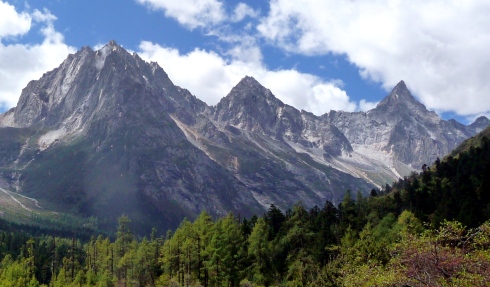[Note: This is a pitch for a magazine article that I’d like to write. I don’t know how to write pitches but I think these few paragraphs stand well on their own. Enjoy.]
Pil’s eyelids are heavy with the tiredness of a man who seldom speaks to anyone but himself. He smokes hash, takes a pull of some local spirit, and hands me the dirty bottle. Its contents taste like acetone but warm me to the toes. Hiding under his thick stubble and nettled mane are the soft features of a fair-born Brit turned leathery by the remote places of the Indian subcontinent. He’d wandered into Chattru from somewhere to the north on this, my tenth evening in the valley. I found him sitting in the dhabba, a strange presence that I could not ignore: Pil is both farangi and sadhu; he is a hermit and an ascetic; he is a powerful and visionary climber; he is the holy-man of so many rocks; he is a climbing yogi, shanti.
The souls of expatriates have always seemed fragile to me, existing as they do in a state of displacement. Yet amongst the boulders of Chattru and nearby Jota Dara, clothed in a strange mix of Tibetan and Hindu mysticism, Pil’s own soul is so obviously light. His are not the concerns of the modern climbing lifestyle, its restive relationship with media, elitism, and celebrity. Living alone in a cave, hours from civilization, he is a climber in the most primitive sense. To the degree possible, Pil’s existence is a reflection on movement over rock and nothing else. To call him a sadhu, though, is to paint a caricature. In fact, it’s the contrast between his approach to spirituality and India’s ancient, baroque asceticism that brings something about my own “climbing life” into much deeper focus. Here in Chattru I see plainly for the first time that the thing that we are doing is unique in the world. It takes Pil to make it obvious that we trying to call a new spirituality from the abyss simply by climbing rocks.
Chattru is not remote by our standards, but our standards don’t apply in the Himalaya. A collection of mud-brick tea houses serves as a night-stop for truck drivers on their long trip between Manali and the villages of outlying Himalchal Pradesh. It’s here that the rough road from Rotang-La winds down to the valley’s narrow floodplain and crosses a turbulent river. The floodplain is a land of orphaned granite, miles upon miles of cast-offs from the five-thousand-and-more meter peaks that hem us in. While the rest of India heaves and sweats Chattru is dry and frostbitten, nestled in the monsoon’s shadow. Here is Pil’s hermitage, his life’s work, and the seat of his spirit. In this valley, waiting long unnoticed, is the best bouldering in all of Asia.
The man, the climbing, and the setting are all exceptional. What is truly compelling about Pil’s story, though, is that it greatly elaborates on the idea of climbing as a spiritual pursuit. Chattru’s austerity — barren earth rushing up to the foot of the Himalaya — and its primal mystique make the singularity of Pil’s life all that much more apparent. There is the resounding sense that if something as naive and idiosyncratic as rock climbing can open the door to Nirvana, it will happen in Chattru.









 Typhoon
Typhoon



